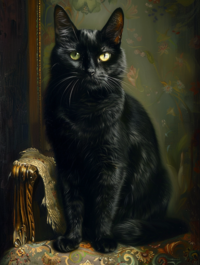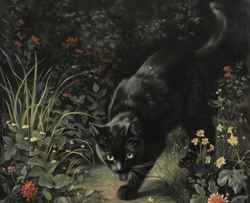Chief Mouser to the Commonwealth: Difference between revisions
m (→History) |
m (→History) |
||
| Line 35: | Line 35: | ||
Upon Snow's death, Vice President Arnaud appointed predecided successor, Pietro, as the new chief mouser. Pietro was notably ineffective, growing notably lethargic and overweight during his short tenure. Upon Cavallo's return from Rostovia in 1817 and witnessing Pietro's unsatisfactory performance, he promptly dimissed him and appointed Toro, a spirited kitten Cavallo found among the ruins during his campaign in Rostovia, symbolised resilience and renewal. Upon his appointment Cavallo stated: | Upon Snow's death, Vice President Arnaud appointed predecided successor, Pietro, as the new chief mouser. Pietro was notably ineffective, growing notably lethargic and overweight during his short tenure. Upon Cavallo's return from Rostovia in 1817 and witnessing Pietro's unsatisfactory performance, he promptly dimissed him and appointed Toro, a spirited kitten Cavallo found among the ruins during his campaign in Rostovia, symbolised resilience and renewal. Upon his appointment Cavallo stated: | ||
{{quote|Like our feline wards, each steward of the republic brings distinct virtues and imperfections to their office. It is through this succession that our nation finds its path to progress. True permanence in leadership can be as detrimental as it is illusory; stagnation, the silent spectre, often follows. As I present Toro, I am reminded of my own impermanence. Leadership ought to be a beacon of change, not an anchor of constancy. We must welcome the new and as surely as we part with the old, for the health of the state depends upon the freshness of its leaders. Thus mindful of my duty, I declary my tenure finite and advocate for establishment of term limits that shall foster renewal and prevent the decay in our cherished institutions.}} | {{quote|Like our feline wards, each steward of the republic brings distinct virtues and imperfections to their office. It is through this succession that our nation finds its path to progress. True permanence in leadership can be as detrimental as it is illusory; stagnation, the silent spectre, often follows. As I present Toro, I am reminded of my own impermanence. Leadership ought to be a beacon of change, not an anchor of constancy. We must welcome the new and as surely as we part with the old, for the health of the state depends upon the freshness of its leaders. Thus mindful of my duty, I declary my tenure finite and advocate for establishment of term limits that shall foster renewal and prevent the decay in our cherished institutions.}} | ||
Following the overthrow of the Sallen Republic | Following the overthrow of the Sallen Republic, the title of chief mouser was abolished as part of a broader initiative of the re-established Kingdom of Sallia to erase Cavallo's legacy viewed as symbols of his administration's populist and anti-monarchical leanings. | ||
The Chief Mouser title experienced a brief resurgence with the establishment of the Sallo-Vitulian Confederation in 1842. As a symbolic gesture to honor Cavallo’s legacy, the confederation appointed two cats, Carlo and Carla, to the role of chief mouser. Named after Cavallo, their tenure aligned with the confederation’s intent to revive and celebrate Cavallo's legacy. However, the confederation was short-lived, plagued by internal divisions and regional conflicts, leading to its dissolution and the subsequent abolition of the title once again. | The Chief Mouser title experienced a brief resurgence with the establishment of the Sallo-Vitulian Confederation in 1842. As a symbolic gesture to honor Cavallo’s legacy, the confederation appointed two cats, Carlo and Carla, to the role of chief mouser. Named after Cavallo, their tenure aligned with the confederation’s intent to revive and celebrate Cavallo's legacy. However, the confederation was short-lived, plagued by internal divisions and regional conflicts, leading to its dissolution and the subsequent abolition of the title once again. | ||
Revision as of 18:05, 7 July 2024
| Chief Mouser to the Commonwealth | |
|---|---|
 | |
 | |
| Government of Eulabia Presidential Executive Office | |
| Residence | TBD |
| Appointer | President of Eulabia |
| Term length | No set length; ends on retirement or death |
| Inaugural holder | Rufus (notional) John "Snow" (official) |
| Formation | c. 1612 1802 (officially) 2014 (current form) |
The Chief Mouser to the Commonwealth[a] is the official title of the resident cat at the executive office and residence of the President of Eulabia in Lunden. This enduring tradition traces its origins to the Kingdom of Sallia and was formally recognised during the subsequent Sallen Republic. The title was first officially created in 1802 by Carlo Cavallo, then President of Sallia, who appointed his cat, John "Snow", as the inaugural chief mouser.
Linked closely with Cavallo’s revolutionary policies, the position was abolished during the Restoration period that sought to dismantle his legacy after 1818. Although the title then lay dormant and was only used unofficially, it was briefly revived between 1842 and 1848 during the Sallo-Vitulian Confederation and later in 2014 by president Oswald Mosley as a nod to its historical significance. From 2014 to 2020, the role was held by Sam. In 2020, Stella, Sam's daughter, began sharing duties with him, and has served alone as the chief mouser since 2020 after Sam retired due to "old age and decreased activity".
History
The tradition of Court Mousers in the Kingdom of Sallia existed informally since 17th century until the early 19th century. The first recorded cat using informal title of Chief Mouser was Rufus, known colloquially as Rufus "the Hussar" due to his characteristic wearing of a hussar helmet. Rufus was a cat of Cardinal Damian, then First Minister of State, during turbulent years of war of religion.
In 1802, upon the establishment of the Sallen Republic, President Carlo Cavallo officially designated the title "Chief Mouser to the Republic", assigning his own cat, John "Snow", a white cat he had rescued during his military campaign against Isfahan. According to Cavallo's Vice President and close confidant, Henri Arnaud, this act had more meanings than one would initially perceive:
President Cavallo often expressed that through seemingly trivial acts, one could convey profound truths. By bestowing an offiical title upon a common house cat, he not only addressed a practical issue but also subtly mocked the elaborate titles and honours of the monarchical system. He saw it as an amusing yet poignant way to highlight the excesses and often empty pageantry of the old regimes. "Why should we not honour those who truly serve us, be they ever so humble?" he would jest.
John "Snow" was widely recognised and became a symbolic figure of Cavallo's presidency, often seen duric public engagements and parades. Snow's death in 1816 deeply affected Cavallo who was at the time campaigning in Rostovia. According to his subordinates withdrew from active command for three days.
Upon Snow's death, Vice President Arnaud appointed predecided successor, Pietro, as the new chief mouser. Pietro was notably ineffective, growing notably lethargic and overweight during his short tenure. Upon Cavallo's return from Rostovia in 1817 and witnessing Pietro's unsatisfactory performance, he promptly dimissed him and appointed Toro, a spirited kitten Cavallo found among the ruins during his campaign in Rostovia, symbolised resilience and renewal. Upon his appointment Cavallo stated:
Like our feline wards, each steward of the republic brings distinct virtues and imperfections to their office. It is through this succession that our nation finds its path to progress. True permanence in leadership can be as detrimental as it is illusory; stagnation, the silent spectre, often follows. As I present Toro, I am reminded of my own impermanence. Leadership ought to be a beacon of change, not an anchor of constancy. We must welcome the new and as surely as we part with the old, for the health of the state depends upon the freshness of its leaders. Thus mindful of my duty, I declary my tenure finite and advocate for establishment of term limits that shall foster renewal and prevent the decay in our cherished institutions.
Following the overthrow of the Sallen Republic, the title of chief mouser was abolished as part of a broader initiative of the re-established Kingdom of Sallia to erase Cavallo's legacy viewed as symbols of his administration's populist and anti-monarchical leanings.
The Chief Mouser title experienced a brief resurgence with the establishment of the Sallo-Vitulian Confederation in 1842. As a symbolic gesture to honor Cavallo’s legacy, the confederation appointed two cats, Carlo and Carla, to the role of chief mouser. Named after Cavallo, their tenure aligned with the confederation’s intent to revive and celebrate Cavallo's legacy. However, the confederation was short-lived, plagued by internal divisions and regional conflicts, leading to its dissolution and the subsequent abolition of the title once again.
List of chief mousers
| Sallen Republic (1802–1818) Sallo-Vitulian Confederation (1842–1848) Commonwealth of Eulabia (2014–present) | |||||
|---|---|---|---|---|---|
| Name | Portrait | Began tenure | Ended tenure | President(s) | Note |
| John (popularly nicknamed "Snow") (1801–1816) |

|
c. 1802 | c. 1816 | Carlo Cavallo | [b] |
| Pietro (1810–1821) |

|
c. 1816 | c. 1817 | [c] | |
| Toro (1817–1826) |

|
c. 1817 | c. 1818 | [d] | |
| Position vacant (1818–1842) | |||||
| Carlo & Carla (1840–1849, 1841–1855) |

|
c. 1842 | c. 1848 | TBD | [e] |

| |||||
| Position vacant (1848–2014) | |||||
| Sam (b. 2008) |

|
12 March 2014 | 5 December 2020 | Oswald Mosley | [f] |
| Stella (b. 2014) |

|
9 November 2018 | Incumbent | [g] | |
Notes
- ↑ Formerly Chief Mouser to the Republic
- ↑ John "Snow" was deeply cherished by Cavallo and became immensely popular among the people. He died in 1817.
- ↑ Pietro's brief and uneventful tenure was marked by a notable lack of enthusiasm for his mousing duties. He was described by the presidential administration as "the laziest cat they've ever seen.". He was eventually sacked by Cavallo upon his return from the war.
- ↑ Toro, a lively kitten brought from the war in Rostovia by Cavallo, was named for his stubborn nature. He served effectively during his brief tenure.
- ↑ Carlo & Carla, named after Cavallo, served during the era of the Sallo-Vitulian Confederation. They were very happy pair and symbolised the unity and shared responsibilities between Sallia and Vitulia.
- ↑ Sam, known for his robust health and effective mousing, helped revive interest in the role. He retired due to old age and decreased activity.
- ↑ Stella, daughter of Sam, started her duties in 2018 together with her father. Noted for her high effectiveness, she took over fully when Sam retired in 2020.

